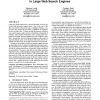1083 search results - page 34 / 217 » Efficient Discovery of Confounders in Large Data Sets |
FLAIRS
2003
13 years 11 months ago
2003
Data mining is the process of extracting implicit, previously unknown, and potentially useful information from data in databases. It is widely recognized as a useful tool for deci...
BMCBI
2006
13 years 10 months ago
2006
Background: Publicly accessible EST libraries contain valuable information that can be utilized for studies of tissue-specific gene expression and processing of individual genes. ...
SSD
1995
Springer
14 years 1 months ago
1995
Springer
Spatial data mining, i.e., discovery of interesting, implicit knowledge in spatial databases, is an important task for understanding and use of spatial data- and knowledge-bases. I...
WWW
2005
ACM
14 years 11 months ago
2005
ACM
Large web search engines have to answer thousands of queries per second with interactive response times. Due to the sizes of the data sets involved, often in the range of multiple...
SIGMOD
1998
ACM
14 years 2 months ago
1998
ACM
Clustering, in data mining, is useful for discovering groups and identifying interesting distributions in the underlying data. Traditional clustering algorithms either favor clust...

